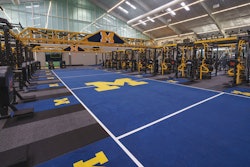Copyright 2017 Gannett Company, Inc.
All Rights Reserved
USA TODAY
With the football season nearing, The Indianapolis Star sat with NCAA President Mark Emmert to discuss various issues surrounding college sports.
Q: The NCAA recently instituted a new sexual violence policy, which was followed by eight U.S. senators writing a letter to the NCAA asking what it will take to develop a uniform policy dealing with recruits and transfers who have a history of sexual assault. What do you think?
A: I think they're asking a lot of good and important questions, particularly questions that have to be answered in conjunction with the rest of higher education. This isn't an athletic issue, it's a higher ed issue. It's not even a higher ed issue, it's a societal issue, but we want to and what the committee (commissioned to combat campus sexual violence) is going to do, is work with higher education leaders so that athletics can be a leader in trying to drive some change around those kinds of questions.
The issues of admission and eligibility and who should be on campuses is obviously an enormously complex one, but it's one we need to get our arms around.
Q: Is that something the membership ought to be discussing collectively or left up to each school?
A: I think it depends. There are parts that need to be discussed on a national level and not just in sport, but across all of higher education. We want campuses to be safe, period, not just because there's concerns about athletes but because there's concerns about all students. So some of those things can be addressed nationally, some can be addressed even at a conference level and some at a campus level. The trick is finding the right role for everybody and then holding everybody accountable.
Q: Why do enforcement cases take so long to adjudicate?
A: In part because the system allows schools 60 days to respond to any allegation or any new information and then our staff has to respond to the responses of the university or the individual. In most cases, they get very drawn out because of the constant exchange between the school and my staff and then the engagement now of legal counsel in all these matters.
We continue to look to see if we can tighten up the exchange. You want to make sure students or anybody involved has time to gather information and respond to an allegation or an issue that's out there.
The most important thing for us is to make sure the process has integrity, moves along at a rate that preferably deals with issues while all actors are still involved -- sometimes by the time you get around to dealing with it the people involved in the original action are gone so we want to try to accelerate it for those purposes.
The tradeoff is making sure everyone has sufficient time to respond and present their information and evidence in a case. We've lowered the time of cases over the past few years quite a lot. Big high-profile cases that are being handled now in some cases look like they've been taking a long time, and indeed they have. If you look at North Carolina, that's been a long process clearly. But that's one where there was a lot of exchange between us and the university and everybody had 60-day response periods, and by the time you play that out, it's a long haul.
Q: The College Football Playoff is 3 years old now. Has it made college athletics more stable because of what it's done for conferences or less stable because of how much money is generated, which creates pressures on schools?
A: First of all, I think the football playoff has been terrific for football. I think the championship has become an extraordinary event. I think it's been a really positive thing for football. It's generated a lot of revenue for those 10 conferences and especially the (Power Five) conferences. And for the most part that's a good thing in that it provides more support for students because that's where most of the money goes.
But it has of course accelerated the financial differences between the Power Five -- we call them the Autonomous Five -- and everybody else. And that creates some tension for sure. But I would certainly rate the football playoff as a very positive thing.
Q: What's the extent to which the NCAA is addressing eSports?
A: Only in an exploratory fashion. This is an activity that's growing extremely rapidly in society, but on campuses as well. We don't know -- we being the (board of governors) and I -- and anyone else don't really know if it makes sense for the NCAA to have a role in eSports. But it's appropriate that we explore it and try to understand it.
A number of our conferences are hosting tournaments now, and some of them are starting to broadcast events on their streaming outlets and their TV networks. Lots and lots of colleges are having teams now, and so we're just trying to see what the landscape looks like and we'll talk about it again at our October meeting.
Litman writes for The Indianapolis Star, part of the USA TODAY Network.
Read More of Today's AB Headlines
Subscribe to Our Daily E-Newsletter
Terms and Conditions Privacy Policy































